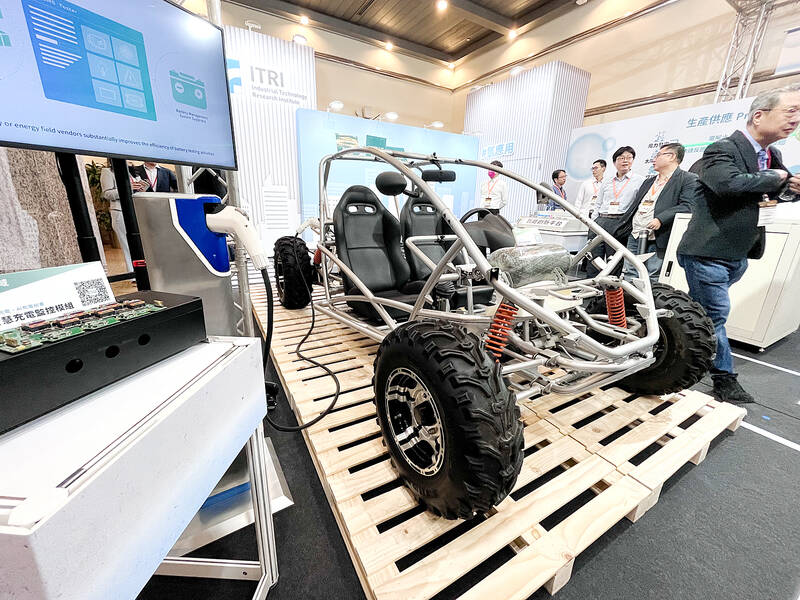Taiwan’s manufacturing output last quarter rose 14.09 percent from a year earlier to NT$4.81 trillion (US$150.17 billion), as local tech firms benefited from avid demand for electronics used for artificial intelligence (AI), high-performance computing and cloud data centers, the Ministry of Economic Affairs said yesterday.
The increase also had to do with some non-tech sectors completing inventory adjustments and a low comparison base in the second quarter of last year, the ministry said in a report.
The manufacturing industry carries heavy weight in the nation’s export-oriented economy, as Taiwan is home to the world’s major suppliers of advanced chips, AI servers, storage and memory, among other products.

Photo: CNA
Computer electronics and optical devices posted the biggest increase of 56.89 percent to reach a new quarterly record of NT$410.5 billion, due to the AI frenzy and restocking demand from smartphone brands, the ministry said.
Taiwanese firms are responsible for making camera lenses for Apple Inc’s iPhone series and other global smartphone brands.
Overall output of electronic components totaled NT$1.52 trillion during the April-to-June period, increasing 24.82 percent from a quarter earlier, the ministry said.
Semiconductors grew 37.71 percent to NT$970.7 billion, the sector’s best showing in history, as the AI boom buoyed demand for 12-inch wafers, the ministry said, adding that chip designers and memory product makers also benefited from a windfall.
In contrast, flat panels and related devices were still affected by tepid end-market demand, and their output declined 5.29 percent year-on-year to NT$127.6 billion, it said.
The retreat coincided with lackluster TV and notebook computer sales.
In the non-tech sectors, business picked up modestly, the ministry said.
Industrial output of chemical and fertilizer products grew 11.13 percent, while the base metal sector posted a 6.82 percent increase, it said.
Machinery equipment suppliers reported 4.2 percent growth, attributable to improving demand from semiconductor firms, the ministry said.
Local semiconductor firms are displaying more interest in expanding capacity to meet fast-growing demand for AI-related products from US customers.
Business from China, Taiwan’s largest export destination, has subdued, consistent with the market’s below-par economic performance, government data showed.
Industrial output of auto parts dropped 4.26 percent, as sales of fuel-powered vehicles came under increasing pressure from electronic vehicles, the ministry said, adding that competition from abroad negatively affected business orders.
The US’ restrictive monetary policy looks unfavorable for global trade, as does lingering US-China competition in the technology sector and geopolitical military conflicts, the ministry said.
Fortunately, US technology giants are pouring money into AI development, which is improving business for local firms in their supply chains, it said.

Semiconductor business between Taiwan and the US is a “win-win” model for both sides given the high level of complementarity, the government said yesterday responding to tariff threats from US President Donald Trump. Home to the world’s largest contract chipmaker, Taiwan Semiconductor Manufacturing Co (TSMC, 台積電), Taiwan is a key link in the global technology supply chain for companies such as Apple Inc and Nvidia Corp. Trump said on Monday he plans to impose tariffs on imported chips, pharmaceuticals and steel in an effort to get the producers to make them in the US. “Taiwan and the US semiconductor and other technology industries

SMALL AND EFFICIENT: The Chinese AI app’s initial success has spurred worries in the US that its tech giants’ massive AI spending needs re-evaluation, a market strategist said Chinese artificial intelligence (AI) start-up DeepSeek’s (深度求索) eponymous AI assistant rocketed to the top of Apple Inc’s iPhone download charts, stirring doubts in Silicon Valley about the strength of the US’ technological dominance. The app’s underlying AI model is widely seen as competitive with OpenAI and Meta Platforms Inc’s latest. Its claim that it cost much less to train and develop triggered share moves across Asia’s supply chain. Chinese tech firms linked to DeepSeek, such as Iflytek Co (科大訊飛), surged yesterday, while chipmaking tool makers like Advantest Corp slumped on the potential threat to demand for Nvidia Corp’s AI accelerators. US stock

The US Federal Reserve is expected to announce a pause in rate cuts on Wednesday, as policymakers look to continue tackling inflation under close and vocal scrutiny from US President Donald Trump. The Fed cut its key lending rate by a full percentage point in the final four months of last year and indicated it would move more cautiously going forward amid an uptick in inflation away from its long-term target of 2 percent. “I think they will do nothing, and I think they should do nothing,” Federal Reserve Bank of St Louis former president Jim Bullard said. “I think the

SUBSIDIES: The nominee for commerce secretary indicated the Trump administration wants to put its stamp on the plan, but not unravel it entirely US President Donald Trump’s pick to lead the agency in charge of a US$52 billion semiconductor subsidy program declined to give it unqualified support, raising questions about the disbursement of funds to companies like Intel Corp and Taiwan Semiconductor Manufacturing Co (台積電). “I can’t say that I can honor something I haven’t read,” Howard Lutnick, Trump’s nominee for commerce secretary, said of the binding CHIPS and Science Act awards in a confirmation hearing on Wednesday. “To the extent monies have been disbursed, I would commit to rigorously enforcing documents that have been signed by those companies to make sure we get